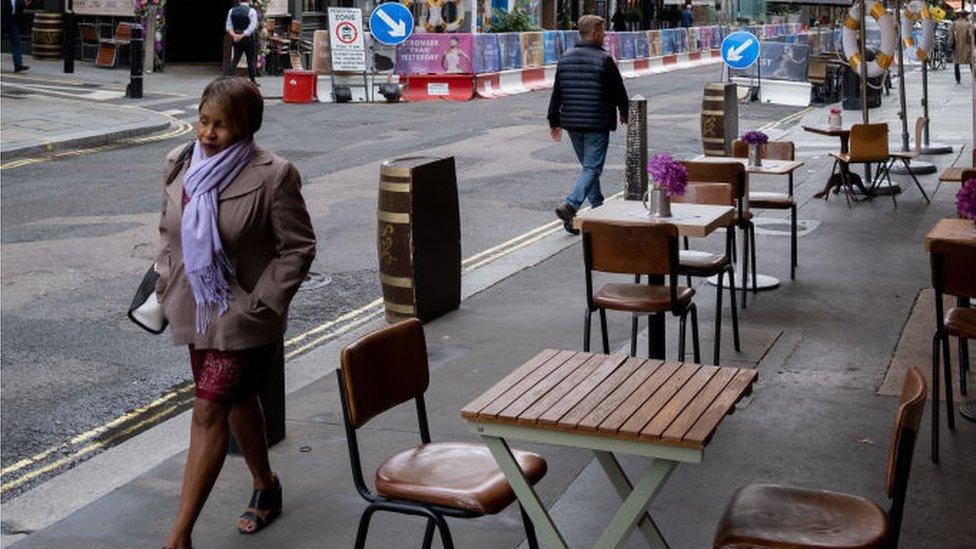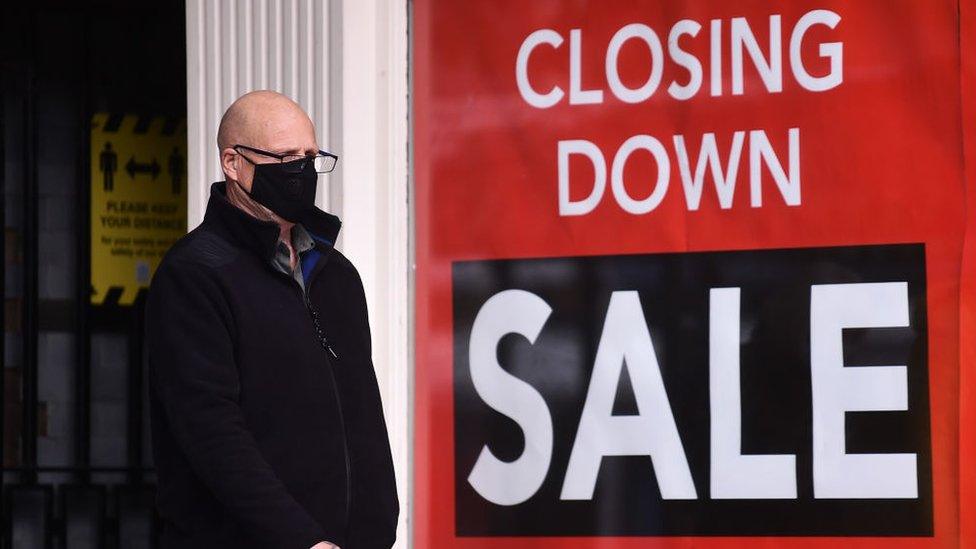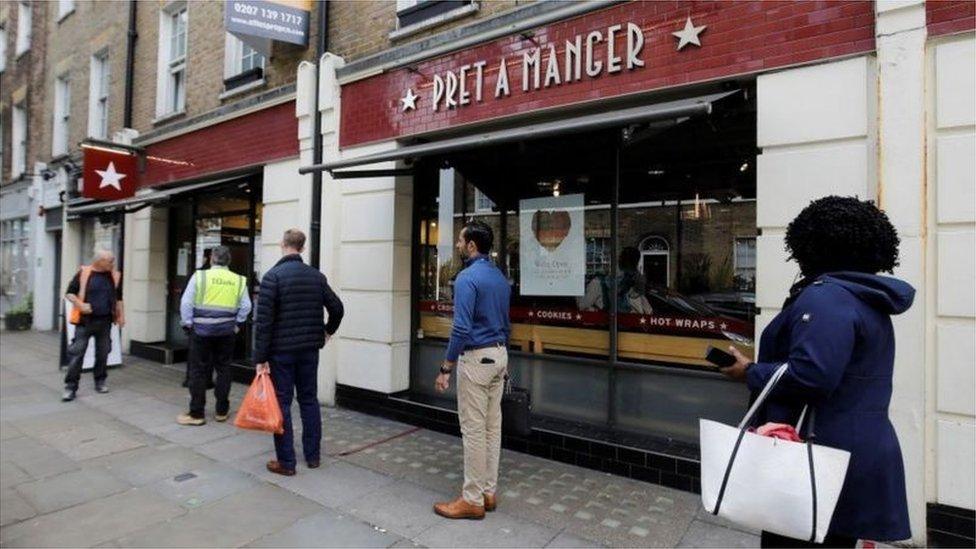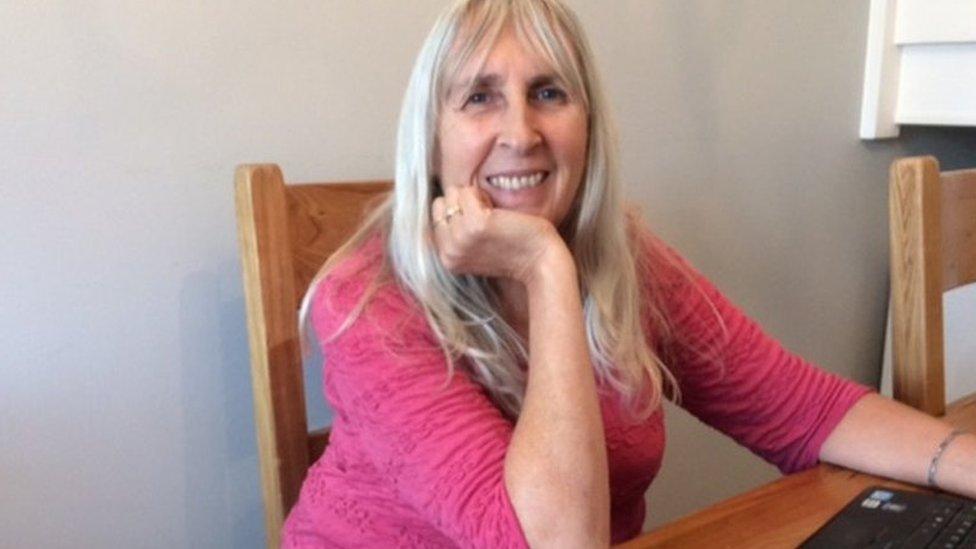Covid-19: Firms warn of 'catastrophic' impact of new coronavirus rules
- Published
- comments

Firms are calling for more financial support to avoid "catastrophic consequences" from tougher coronavirus restrictions.
Without more help there could be mass redundancies and business failures, the British Chambers of Commerce warns.
Its call for a new approach comes as tougher restrictions are imposed on large parts of the UK.
The government said it had already put in place support worth more than £200bn to help firms cope.
"We know this continues to be a very difficult period for businesses," a spokesman said. "That's why we have put in place a substantial package of support."
The government has already announced extra supportfor firms affected by new measures to control the virus, including providing two thirds of workers' wages where firms have been told to close. Firms will also receive grants of up to £3,000 per month.
There is additional funding for local authorities and devolved administrations.
'Grave situation'
The director general of the BCC, which represents 75,000 firms of varying sizes across the UK, has written to the prime minister calling for a new set of criteria to be applied before imposing tougher restrictions.
"The situation for business grows graver by the day," Adam Marshall wrote.
"Enhanced support must be given to those facing the indirect impacts of restrictions and closures - in supply chains, tourist destinations and town and city centres."
The letter, external outlines a set of conditions firms would like to see in place before restrictions are imposed.
It says there should be evidence of the effectiveness of the proposed measures, businesses should be given time to prepare, and financial support should be available, both for firms forced to closed, and those indirectly affected.
While some businesses are required to close in areas under the strictest measures, many more firms say their business will be badly affected by a drop in demand as people are asked to limit some activities, travel and socialise less.
Some businesses in England say they would rather be closed down under the tier three (very high alert) measures and receive financial support, than see demand for their services destroyed in a tier two (high) area, the BCC said.

TEST AND TRACE: How does it work?
THREE TIERS: How will the system work?
SOCIAL DISTANCING: Can I give my friends a hug?
TESTING: How do I get a virus test?

The prime minister announced the new three tier system for England last week - pointing to sharply-rising transmission rates for the virus in some parts of the country.
Mr Johnson told the House of Commons: "This is not how we want to live our lives but this is the narrow path we have to tread between the social and economic trauma of a full lockdown and the massive human, and indeed, economic cost of an uncontained epidemic."
The government has introduced the toughest tier three restrictions in Liverpool and Lancashire, which means pubs and bars not serving food must close and households are not permitted to mix.
Many other parts of England, including London, York and Essex, are now in tier two, the second highest level of measures. This means people from different households may not meet indoors including inside cafes and restaurants.
In Northern Ireland, pubs, restaurants and cafes have closed to sit-in customers for the next four weeks, while in Scotland's central belt most licensed premises are closed under temporary restrictions.
In Wales, a two-week "fire break" - a period with tighter restrictions to help break the trajectory of coronavirus cases rising - is expected within days.
Test and Trace 'failure'
The BCC is also calling for changes to the NHS Test and Trace system.
"The need for additional restrictions cannot be blamed on a lack of care by hardworking people in businesses across the country," the letter said.
"Instead it represents a failure of the test and trace system, which must be urgently improved and expanded."
It suggests any period of enhanced restrictions should be used to speed up the effectiveness of NHS Test and Trace, including putting a focus on rapid testing and low-cost testing in workplaces.
Cabinet minister Michael Gove told the BBC's Andrew Marr programme that the number of people being tested was higher than ever before and that "contact-tracing was improving all the time".
But he said that "any test and trace system has less utility as the virus grows".
Since the start of the pandemic, the number of people employed across the UK is down by around half a million, according to the Office for National Statistics, while some self-employed workers and entrepreneurs have lost significant amounts of work.
The government provided support to employees and businesses at the start of lockdown in March, including VAT cuts, business rates holidays, extended loan schemes and the furlough scheme which provided 80% of wages for those unable to continue working.
However, the furlough scheme is being phased out, and will be replaced at the end of this month by a less generous job support scheme.

THE NEXT MUST-SEE DRAMA IN LOCKDOWN: The Salisbury Poisonings
ONLINE REHEARSALS: Tennant and Sheen continue rehearsals at home

- Published20 October 2020

- Published16 October 2020

- Published30 September 2020
